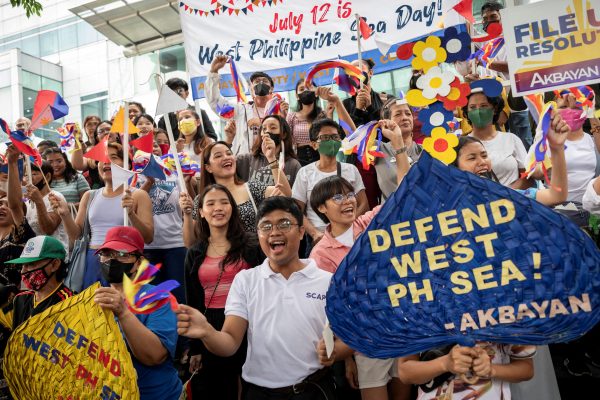But great powers are congenitally bad at doing the opposite, facing less urgent incentives to assimilate the worldviews of smaller states. As Jonathan Kirshner observed recently in an incisive critique of influential realist accounts of US–China competition, ‘like oligopolists in an economy, [great powers] are not just subject to market forces; their behavior shapes the nature of the market itself.’
As Greg Poling and Jude Blanchette argue in this week’s lead article, the obtuse outlook of the hawks in China’s elite about their neighbours’ security anxieties has ‘now become one of the most prominent challenges to [China’s] management of external relations’.
They see the deepening tensions between the Philippines and China over maritime claims in the South China Sea as illustrative of ‘Beijing’s unwillingness to treat the concerns and grievances of its regional neighbours as legitimate’, rather than reflective of their status as ciphers for the United States.
On the face of it, alienating the Philippines by stepping up the grey-zone military tactics to enforce China’s claims over islets within Manila’s Exclusive Economic Zone seems a blunder — forgoing the opportunity to compete for the goodwill of a US treaty ally with a rising political and economic profile within Southeast Asia.
Yet the perception that diplomatic stoushes with US allies in the region are proxy struggles with Washington raises the stakes for China over what might otherwise be a relatively subdued political disagreement. This ‘increases the risks of escalation as Beijing seems to believe that other states are less committed to their sovereignty and rights, [and] defy China only because of American interference and will eventually buckle in the face of sustained pressure’, as the Philippines is now seeing.
What’s to be done about this problem from the perspective of US allies in the region? The first is to take China’s great-power solipsism as something to be managed rather than something they can expect to change. There is little to be risked by being less cautious in articulating Asia’s common concern with ensuring stable US–China relations, and the importance of being able to pursue both political and economic ties with Beijing and Washington as their interests all dictate.
Chinese policymakers aren’t entirely paranoid when they see some US allies as proxies for the United States in a containment strategy — such a goal is, without a doubt, one element in the recent US effort to multilateralise the US alliance network in East Asia, and one potential function of the minilateral cooperation embodied in the Quad.
But deepening ties with the United States in response to worries about China isn’t just an atavistic run behind American apron strings. It is a natural adaptation to the reality that the homegrown ASEAN-centred security architecture needs to be more robust in addressing China’s dangerous embrace of grey-zone military tactics in its immediate neighbourhood, and in managing the hazards of US–China competition more generally.
For all its shortcomings, if ASEAN didn’t exist the region would have to invent it. Crucially, as the product of decades of Southeast Asian institution-building and infused with its small-and-middle-power ethos of cooperation and non-alignment, it cannot be painted as a cut-out for the United States. ASEAN makes Southeast Asian nations larger than the sum of their parts: through the association, they enjoy diplomatic and geostrategic leverage.
The South China Sea is the primary test of ASEAN’s credibility as a platform for managing regional security problems. Leadership on the issue — even at the rhetorical level — is necessary beyond the discussions around a Code of Conduct, that has become a masterclass in diplomatic procrastination.
The political touchstone for ASEAN in addressing this challenge should be the 2016 International Court of Justice (ICJ) tribunal ruling that China’s so-called ‘nine-dash line’ is not a legally valid basis of a claim to features in the South China Sea. The tribunal also found that China’s activities within Manila’s EEZ, the source of the crisis potentially unfolding now, were a violation of sovereignty.
More explicit reference to the 2016 ICJ ruling in official ASEAN statements would have an important political effect, as would the determination of ASEAN members themselves moving quickly and peacefully to resolve the disputes over their own overlapping disputes, and in line with international law.
This will require significant investment in quiet coalition-building, especially by Indonesia, which implicitly expressed support for the 2016 ICJ ruling, albeit quietly, in 2020, and which has been making tentative steps at intra-ASEAN ‘minilateralism’ on maritime security.
There are risks for ASEAN, and its member states, in eliciting internal division and Chinese anger by grabbing the South China Sea issue with both hands. For Indonesia, something of a bellwether for the region, if a strategy of letting sleeping dogs lie has worked so far, what interest does it have to take a leadership role in bringing ASEAN to bear on such a sensitive security issue?
That line of thinking ignores the costs of allowing ASEAN’s relevance in the security arena to fade. If ASEAN-based frameworks can’t address the hazards to the rule of international law, and the sovereignty of ASEAN member states in the South China Sea, then the incentive for some states to abet the Cold War dynamics engendered by US attempts to contain China will only increase. A stronger ASEAN fundamentally gives these countries options.
The EAF Editorial Board is located in the Crawford School of Public Policy, College of Asia and the Pacific, The Australian National University.

